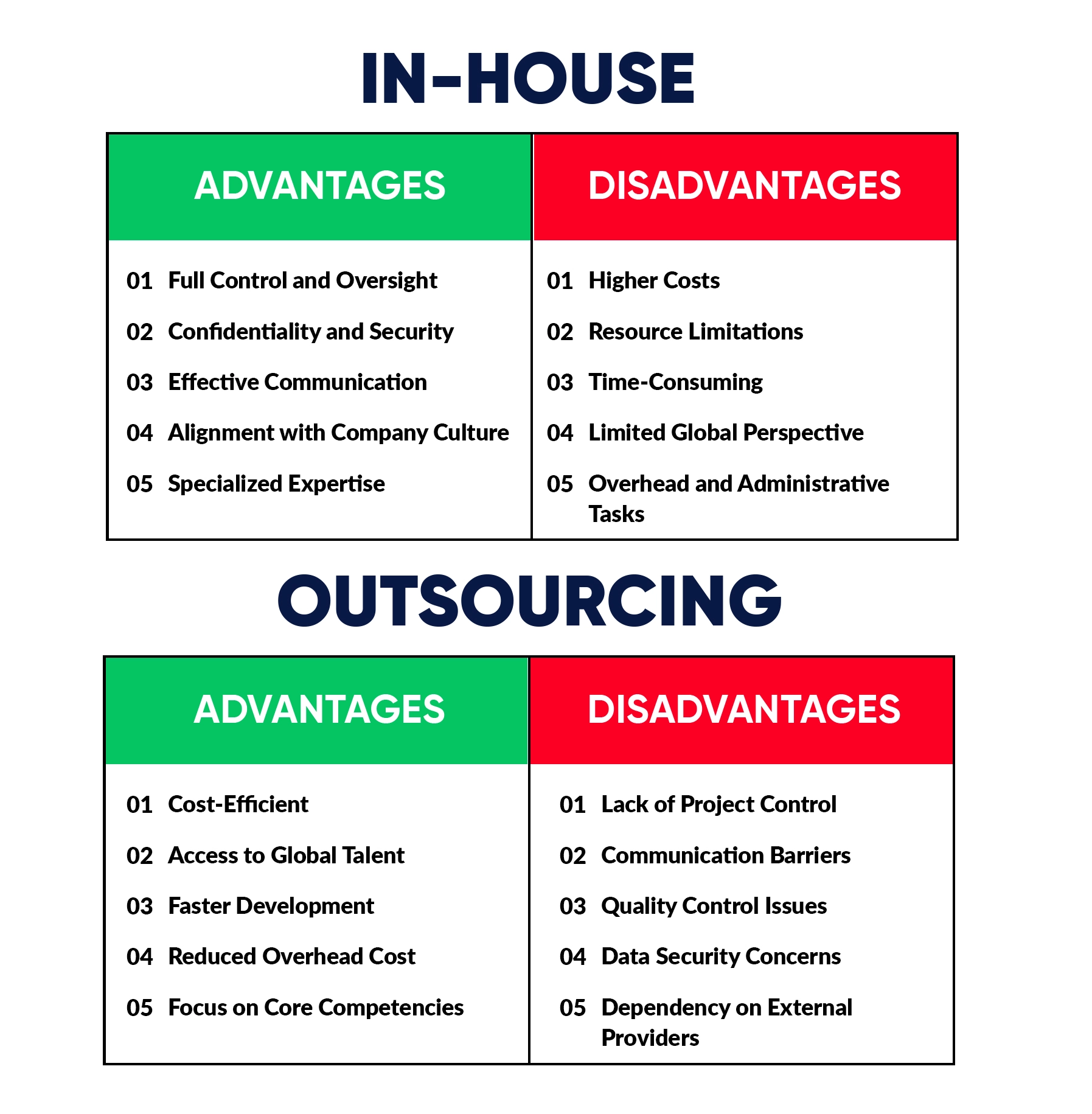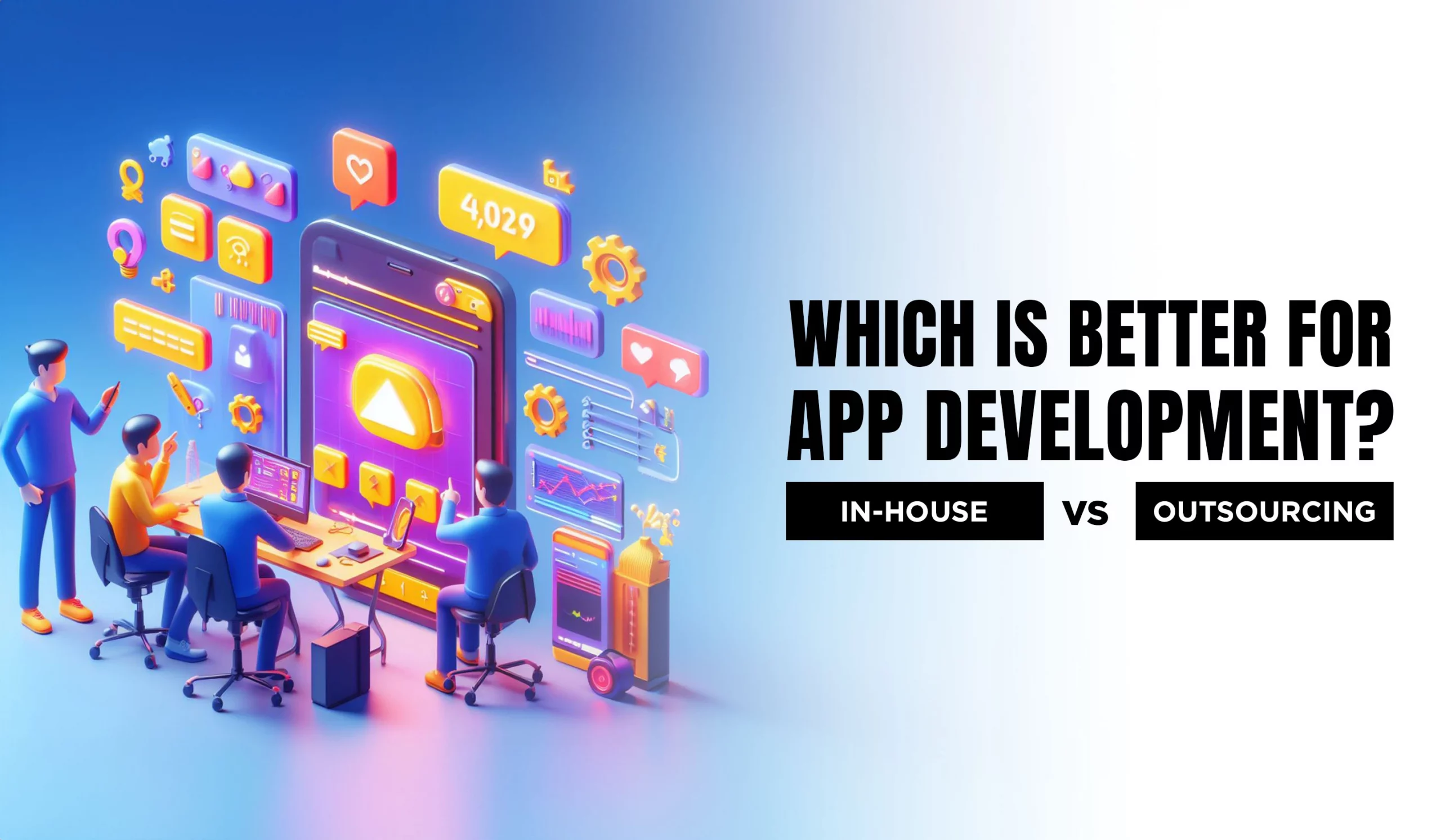When it comes to app development, most businesses often have a big confusion about choosing the right path for developing their dream app. In the mobile app development industry, there are two methods that are widely popular in-house and outsourcing.
Each option has its own advantages and disadvantages. In-house app development gives you more control over the project but its cost is comparatively high. While outsourcing is cost-efficient you don’t get much control.
So, the decision of which path is suitable for your project matters a lot. It is because a wrong decision can lead to a significant negative impact on your budget and also the success of the project. Therefore, it is extremely important to determine the most suitable option.
In this article, we will give a detailed and comparative analysis of in-house vs outsourcing for app development. If you are a startup or business founder going to invest in app development, this post will help you understand all the key aspects of in-house and outsourcing. And thus, you will be able to make the right decision.
So let’s get started
Table of Contents
Why It Is Important To Decide Between In-House And Outsourcing?
Mobile app development is a complex and time-consuming process. It requires great technical and software development expertise to build a full-fledged mobile application. You need a dedicated team of different professionals that includes developers, designers analysts, project managers, and business analysts. Hence, to manage all these team members also requires additional effort.
Apart from this, the cost of mobile app development is high. It can start from $10,000 and go up to $300,000. At each stage, you will need to work along with the development team and monitor the entire flow. Any negligence or not implementing the right development strategies might bring several counter-productive results such as
- Cost overruns
- Missed deadlines
- Quality issues
- Inefficient resource allocation
- Data security concerns
- Lack of scalability
- Non-alignment with business goals
- Competitive disadvantage
Startups and entrepreneurs that run on a limited budget can’t afford the consequences of bad hiring or choosing the wrong development strategies. According to The Undercover Recruiter’s report, bad hires might cost $24,548-$35,685 to hire a full-time developer. As per CareerBuilder, 74% of companies that made a poor hire lost an average of $14,900 per poor hire.
Therefore, to mitigate these consequences, it’s crucial to thoroughly assess your unique business needs, project requirements, and resources before deciding between in-house and outsourcing. Each approach has its advantages and disadvantages, and the right choice will depend on your specific circumstances.
This will not only help you save your valuable resources but also enable you to achieve business goals successfully. Thus, let’s explore all the key aspects of in-house and outsourcing for mobile app development.
Overview of In-House App Development
In-house app development refers to the process of creating mobile applications using your organization’s internal resources. It is about hiring and managing a dedicated team of developers, designers, and other necessary experts. This approach involves building and maintaining the app entirely within your company. It eliminates the need for relying on external contractors or third-party development agencies.
Advantages of In-House App Development
Full Control and Oversight
With an in-house team, you have direct control and oversight of every aspect of the app development process. You can make real-time decisions, adjust project priorities, and maintain a hands-on approach. This allows you to ensure the app aligns with your business goals and vision.
Alignment with Company Culture
In-house development helps you to integrate the app development process seamlessly with your company’s culture, values, and objectives. Your internal team is intimately familiar with your company’s mission, strategies, and unique requirements. As a result, they can make sure that the app reflects your brand identity and business priorities.
Specialized Expertise
Over time, an in-house development team can accumulate specialized expertise in your industry whether it is health, retail, or on-demand business. They have proven expertise in the latest technology stack for app development. They can apply their knowledge to create tailored solutions for your business needs.
Confidentiality and Security
In-house development can enhance data security and confidentiality. Your organization can establish and maintain robust security protocols. Thus, it helps in making sensitive information protected. You have more direct control over data access and protection.
Effective Communication
Communication within an in-house team is typically more straightforward. Team members are often physically located in the same workspace or connected through regular communication channels. This proximity promotes effective collaboration, the rapid resolution of issues, and the efficient exchange of ideas and insights.
Long-Term Ownership
When you develop an app in-house, you get long-term ownership of the code, intellectual property, and all associated assets. This can be advantageous if the app is central to your business model and long-term strategies, as it allows you to maintain full control and adapt the app as needed.
Adaptability and Iteration
In-house teams can quickly adapt to changing requirements and iterate on the app as necessary. This agility enables you to respond to user feedback, industry shifts, and emerging opportunities more efficiently.
Disadvantages of In-House App Development
Higher Costs
In-house app development is often more expensive than outsourcing. This is due to the overhead costs associated with hiring and maintaining an internal team. For instance, salaries, benefits, office space, equipment, and ongoing training. The expenses can significantly impact your project budget.
Resource Limitations
Building a skilled and experienced in-house development team can be challenging, particularly in competitive job markets. It may take time to recruit the right talent, and you might face resource limitations if you don’t have the necessary skills in-house.
Time-Consuming
Setting up an in-house development team can be time-consuming. It involves the recruitment and onboarding of team members, the acquisition of development tools and resources, and the establishment of development processes. This setup phase can delay the app’s time-to-market.
Limited Global Perspective
In-house teams may lack the diversity of perspectives and global insights that an outsourcing partner can provide. This can limit the creativity and innovation in mobile app development services. As a result, solutions may lack a broader market perspective.
Extra Management Efforts
In-house development can require a significant allocation of resources, including time and attention from management and other staff members. This resource allocation might divert essential personnel away from core business functions.
Overhead and Administrative Tasks
Managing an in-house team involves administrative tasks such as payroll, benefits, and human resources management. These additional responsibilities can consume time and resources that might be better spent on core business activities.
Difficulty Scaling Up or Down
In-house teams may struggle to quickly scale up or down to meet changing project demands. If your company experiences unexpected growth or a need for additional resources, this can be challenging to manage internally. Hence, you have to prepare a dedicated plan for app updation and allocate resources accordingly.
How Much Does it Cost to Set Up an In-House App Development Team?
On average, the cost of hiring an in-house app development team might vary from $5,000-$20,000 per month. However, the final cost figure may vary depending on several factors developer’s location, per-hour rate, experience, technology expertise, and so on. In the case of custom app development, you need to define your project requirements. And then you can determine the exact cost.
Overview of Outsourcing App Development
Outsourcing means when a business enitity partners with external companies or hands over their projects related to the design, development, and maintenance of its mobile applications. This approach allows businesses to leverage external expertise and resources to create high-quality mobile apps. Thus, they save significant amount of time, effort, and cost while focusing on their core competencies.
Advantages of Outsourcing App Development
Cost-Efficient
Outsourcing often proves more cost-friendly as compared to maintaining an in-house team. Through outsourcing you access highly skilled developers and other professionals at a lower cost than hiring them locally. Outsourcing companies typically have established infrastructure and resources. Hence, it reduces your overhead expenses.
Access to Global Talent
By outsourcing, you gain access to a global pool of talented professionals and specialized expertise. This allows you to assemble a team with precisely the skills and experience needed for your project, regardless of geographic location. You can tap into diverse perspectives and technological insights that may not be available in your local talent pool.
Faster Development
Outsourcing can often lead to faster development times. Many outsourcing firms are experienced in app development and follow efficient processes. Consequently, it decreases the time needed for project setup and execution. They can also allocate dedicated resources to your project, speeding up development timelines.
Scalability
Outsourcing partners can quickly scale up or down to meet the changing demands of your project. This flexibility is particularly valuable for businesses that experience fluctuations in workload. Or they need additional resources during specific project phases.
Reduced Recruitment Overhead Cost
When you outsource app development, you eliminate the need for administrative tasks like hiring, onboarding, payroll software, benefits management, and other HR-related functions. This frees up your internal resources to focus on core business activities.
Focus on Core Competencies
By entrusting app development to external experts, your organization can concentrate on its core competencies and strategic initiatives. This can lead to improved productivity, efficiency, and overall business performance.
Access to Technology Trends
Outsourcing partners typically stay updated with the latest technological trends and best practices. They can incorporate cutting-edge technologies and features into your app. As a result, you get opportunity to leverage emerging technology trends and competitive advantage.
Read More: Why Should App Development Company Keep the Future Trends in Mind to Create Sustainable Apps?
Risk Mitigation
Outsourcing providers are experienced in managing all kinds of risks associated with mobile app development projects. They can handle potential challenges, such as scope changes or technical difficulties. Consequently, it helps you reduce the potential risks and losses.
Disadvantages of Outsourcing App Development
Communication Barriers
When working with a geographically distant outsourcing partner, communication challenges can arise due to various reasons. You may not be able to communicate effectively due to different time zones, language barriers, and cultural variations. These challenges can lead to misunderstandings, project delays, and reduced efficiency.
Quality Control Issues
Ensuring the quality of the app development process can be more challenging when outsourcing. There may be a lack of direct oversight. So, you have to establish clear quality assurance processes and expectations.
Data Security Concerns
Data security is among the top concerns for all business stakeholders. When you outsource you have to share sensitive business data, proprietary information, and intellectual property with an external partner. Hence, it can raise data security concerns. You need to carefully vet mobile app development service providers. And establish robust data security protocols to protect confidential information.
Risk of Misalignment with Company Culture
Outsourced teams may not fully understand or align with your company’s culture, values, and objectives. As a result, this can lead to a disconnect between your organization’s vision and the development team’s approach.
Dependency on External Providers
Relying on external partners for critical app development services can create dependency. If the outsourcing relationship breaks down or the partner faces issues, it may disrupt your project and hinder your ability to address urgent concerns.
Hidden Costs
While outsourcing can be cost-effective, it’s crucial to account for potential hidden costs. For example, contractual disputes, change requests, and scope creep. This eventually increases the project’s overall cost.
Lack of Project Control
Outsourcing means relinquishing some control over the development process. This can free your company to focus on core activities. However, it may lead to other concerns about decision-making, project management, and changes in direction.
Conflict Resolution
Disputes and conflicts may arise in any project. Resolving these issues with an external partner can be more complicated and time-consuming as compared to in-house team. You can’t address issues instantly with the outsourcing partner like within an in-house team.

How Much Does it Cost to Outsource App Development Project?
The cost of outsourcing app development project can range between $10,000-$300,000. The final value primarily depends on the company’s location. If you outsource your project to a mobile app development company in USA, the total cost of outsourcing app development might go around $100-$180 per hour. Hence, the best method would be to first decide the country or region and then you can get an accurate cost estimation.
Comparison Table: In-House vs Outsourcing
| Aspect | In-House App Development | Outsourcing App Development |
| Control and Oversight | High | Moderate |
| Alignment with Culture | High | May Vary |
| Specialized Expertise | Limited | Access to Diverse Expertise |
| Cost Efficiency | Costly | Cost-Efficient |
| Resource Availability | Limited by Budget | Access to Global Talent |
| Time-to-Market | Slower | Faster |
| Confidentiality/Security | Easier to Manage | Requires Careful Vetting |
| Communication | Efficient | Time-Consuming |
| Scalability | Limited | Highly Scalable |
| Risk of Turnover | Manageable | Less Control Over Personnel |
| Flexibility | Tailored to Needs | Flexibility in Team Size and Skills |
| Administrative Overhead | Requires HR Management | Reduced Administrative Tasks |
| Focus on Core Competencies | Challenging | Easy |
| Technology Trends | May Lag Behind | Access to the Latest Trends |
| Long-term Commitment | Commitment Required | Short-Term or Project-Specific |
Time For Final Verdict: Which Is Better In-House vs Outsourcing?
The decision between in-house and outsourcing app development is not one-size-fits-all. It largely depends on your specific business needs, resources, and long-term goals. Both approaches have their merits and demerits. The choice should be tailored to your business goals and the specific requirements of your app development project.
You Should Go With The In-House Approach For App Development When:
- Your organization requires full control and oversight of the development process.
- The app aligns closely with the outsourcing partner’s culture and values.
- You have the resources to invest in specialized expertise and long-term development needs.
- Confidentiality and security are paramount for your project.
- Your project is long-term, and you have the commitment and resources for ongoing app development.
You Should Go With Outsourcing Approach For App Development When:
- You have a limited budget, and can’t afford additional costs.
- Access to specialized expertise and global talent is essential for your project.
- You need to expedite the development process and achieve faster time-to-market.
- Scalability and flexibility are crucial for your project’s success.
- Your organization seeks to focus on core competencies and strategic initiatives.
What About Hybrid Approach?
In many cases, a hybrid approach that combines both in-house and outsourcing elements may be the most effective solution. It enables you to leverage the strengths of each approach while mitigating their respective weaknesses. For example, you might develop the core app features in-house. And then outsource specific development tasks or ongoing maintenance to external partners.
Concluding Thoughts
We hope this blog has cleared off all your doubts and concerns regarding in-house vs outsourcing. As we discussed both approaches have their own advantages and disadvantages. Ultimately, the right decision will depend on a thorough assessment of your organization’s unique needs, resources, and long-term goals. You need to consider the specific requirements of your mobile app development project. Based on this, you can choose any approach between in-house and outsourcing.












 India
India USA
USA Australia
Australia Canada
Canada UK
UK UAE
UAE
